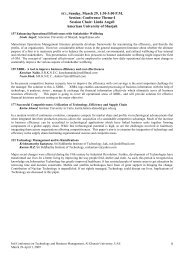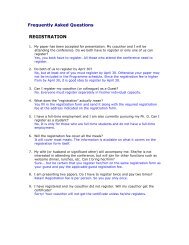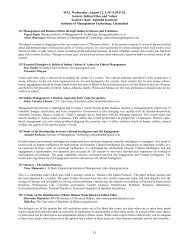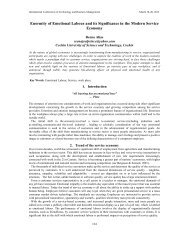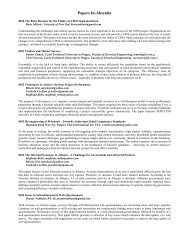Contributed Papers - Icmis.net
Contributed Papers - Icmis.net
Contributed Papers - Icmis.net
Create successful ePaper yourself
Turn your PDF publications into a flip-book with our unique Google optimized e-Paper software.
1E-2, Saturday, January 1, 5:10-6:50 P.M.<br />
Session: OB-I<br />
Session Chair: Jaba Gupta<br />
T. A. Pai Management Institute<br />
8038 Empowering Investors by Demystifying Performance Measurement Communications<br />
Jatin Pancholi, Middlesex University, j.pancholi@mdx.ac.uk<br />
Ashwin Modi, S K School of Business Administration, ashwin_modi@yahoo.com<br />
Narayan Baser, Shri Jairambhai Patel Inst of Bs Mgmt & Computer Applications, baser_narayan@yahoo.com<br />
Evidences in literature suggest that educated and empowered investor will bring fundamental upward shift in the savings and<br />
investments pattern of an emerging economy like India. Knowledge and skills of ability to read and interpret annual reports should<br />
not remain hegemony of only experts and analysts but should strategically percolate down to common investors in an<br />
institutionalized inclusive economy. This paper empirically examines communications of performance measurement indicators in<br />
Annual Reports. The paper focuses on nature of lexicon, usage of data in visual formats such as tables, graphs, exhibits,<br />
photographs and such other information in these annual reports.<br />
8105 Determinants of Knowledge Sharing Behavior: Developing a Conceptual Framework<br />
Soofi Anwar, Birla Institute of Technology- Ranchi( UAE Campus), soofianwar@gmail.com<br />
Durga Prasad K.<br />
In today’s ‘knowledge driven economy’, creating a pro knowledge sharing environment and reinforcing actual knowledge sharing<br />
behavior is central to the success of any knowledge management(KM) initiative. Universities and Higher Education Institutes<br />
have an enormous scope to apply KM to acquire, use and leverage knowledge. This paper attempts to explore the factors that<br />
encourage or inhibit knowledge sharing behavior. The various factors influencing knowledge sharing have been categorized into<br />
individual, organizational and technological factors. Understanding of these motivators and barriers would help develop<br />
organizational strategies to encourage and foster knowledge sharing.<br />
8304 Managing the Self: The Paradigm Shift in the Decade Ahead<br />
Neha Saxena, University of Petroleum and Energy Studies, nehasaxena309@gmail.com<br />
Industrial civilization is entering a decisive phase today. On many fronts, the crumbling of this colossal industrial set up is<br />
becoming apparent. The application of traditional Indian spiritual concepts for the analysis and solution of management problems<br />
like leadership, teambuilding, stress management, improving standards of work life etc. has been propagated by various writers.<br />
The present paper focuses on this evolutionary process of expanding the value consciousness of business organization to be<br />
carried forward to the inner domain of managing the self.<br />
8323 Effect of Economic Recovery on Managing Organizational Conflicts: A Communicative Approach<br />
Jaba Gupta, T. A. Pai Management Institute, jaba.m.gupta@gmail.com<br />
B. Sasidhar, King Saud University, bokkasamsasidhar@gmail.com<br />
This paper is an extension of a recently published exploratory study of interpersonal conflict handling in multinational<br />
organizations in India. The study showed that in modern organizations that thrive on teamwork, collaboration and<br />
interdependence, more interaction and better interpersonal communication skills are required than before. However, the changed<br />
environment also causes more conflicts that in turn affect the work environment. In a changed context, this paper studies the effect<br />
of economic recovery on various causes of conflicts, ways in which conflicts are handled, frequency of conflicts and whether or<br />
not communication helps in the resolution of conflicts.<br />
8352 Managing Workplace Stress<br />
Meera Sharma, Shri Guru Ram Rai Institute of Technology & Science, researchguide@ymail.com<br />
R.L. Raina, Shri Guru Ram Rai Institute of Technology & Science, ratanraina10@yahoo.co.in<br />
Abhay Kumar Tiwari, ICFAI University, tiwariak@email.com<br />
Stress refers to situations when an individual is unable to cope up with the pressures in a job. It was found that 80 million working<br />
days are lost each year due to work force stress. Organizations at large are realizing the importance of retaining the potential<br />
workforce in an organization which is more possible when Stress-Free Working conditions are developed at the work place. As<br />
prevention is better than cure, this paper is an attempt to throw light on Job stress and its negative outcomes and recommend<br />
various strategies to put a impede to Stress at workplace



